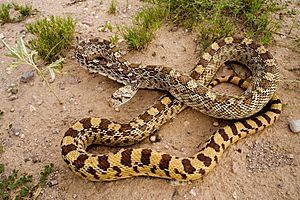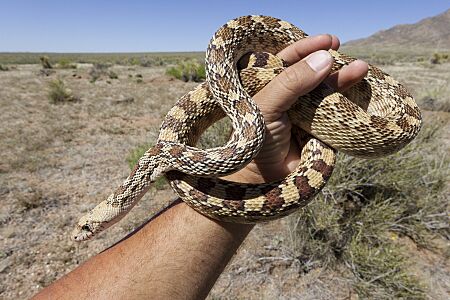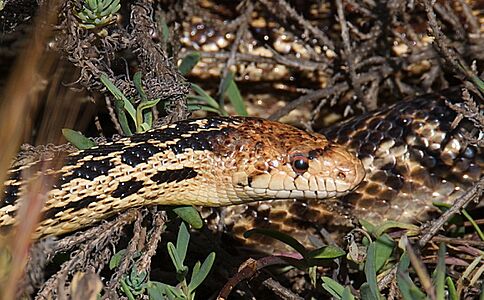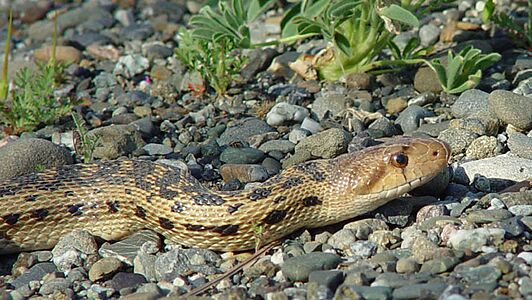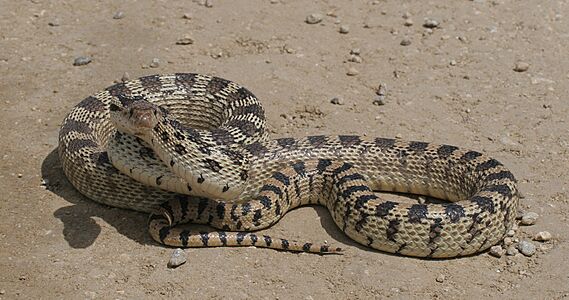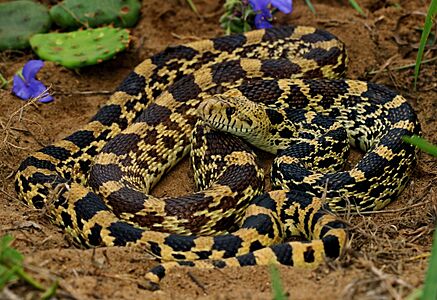Gopher Snake facts for kids
Quick facts for kids Gopher Snake |
|
|---|---|
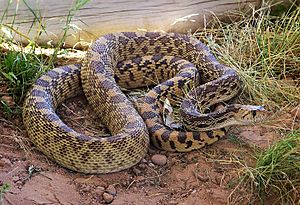 |
|
| Conservation status | |
| Scientific classification |
|
| Kingdom: | Animalia |
| Phylum: | Chordata |
| Class: | Reptilia |
| Order: | Squamata |
| Suborder: | Serpentes |
| Family: | Colubridae |
| Genus: | Pituophis |
| Species: |
P. catenifer
|
| Binomial name | |
| Pituophis catenifer (Blainville, 1835)
|
|
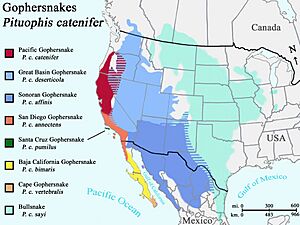 |
|
| Script error: The function "autoWithCaption" does not exist. | |
| Synonyms:Common names: Pacific gopher snake, coast gopher snake, western gopher snake (more here). | |
|
|
Script error: No such module "Check for conflicting parameters".
The Pituophis catenifer, also known as the gopher snake, is a fascinating snake found in North America. It's a type of colubrid snake, which means it is not venomous. This snake is often confused with rattlesnakes because of its similar looks and defensive actions.
However, you can easily tell a gopher snake apart from a rattlesnake. Gopher snakes do not have a rattle on their tail. Their tails also lack the black-and-white bands seen on rattlesnakes. Plus, a gopher snake's head is narrower and more rounded than a rattlesnake's. Rattlesnakes have wider, more triangular heads because of their venom glands.
Contents
What's in a Name?
The scientific name for this snake is catenifer. This word comes from Latin and means "chain-bearing." It refers to the chain-like pattern you can see on the snake's back.
How to Spot a Gopher Snake
Adult gopher snakes are usually quite long. They can grow to be between 36 and 84 inches (about 91 to 213 centimeters) when they are fully grown.
Their backs are typically yellowish or a light, sandy brown. They have a series of large, dark brown or black markings. Smaller, darker spots run along their sides. Their bellies are a lighter yellowish color, sometimes with brown markings. The exact colors and patterns can vary a bit depending on the specific type of gopher snake.
Gopher Snake Behavior: Clever Defenses
Gopher snakes have a very clever way to protect themselves from danger. When they feel threatened, they puff up their bodies to look bigger. They then curl into a pose that looks just like a rattlesnake ready to strike!
However, instead of biting with an open mouth, a gopher snake often strikes with its mouth closed. It uses its blunt nose to bump and warn off predators. Gopher snakes also vibrate their tails quickly, which sounds a lot like a rattlesnake's rattle. Scientists think this might be a way for gopher snakes to mimic (copy) rattlesnakes. This trick works because predators know to avoid venomous rattlesnakes.
How Long Do Gopher Snakes Live?
In the wild, gopher snakes usually live for about 12 to 15 years. However, some gopher snakes kept in zoos or as pets have lived much longer. The oldest one recorded lived for over 33 years!
Different Names for Gopher Snakes
People use many different names for this snake and its various types. Some common names include:
- Pacific gopher snake
- Henry snake
- Coast gopher snake
- Bullsnake
- Western gopher snake
- Sonoran gopher snake
- Great Basin gopher snake
- Blow snake
- Yellow gopher snake
Types of Gopher Snakes: Subspecies
There are several different types of gopher snakes, called subspecies. These subspecies often have slight differences in their appearance or live in different parts of North America. As of 2025, scientists generally agree on six main subspecies. They live across southern Canada, the United States, and Mexico.
| Common Name and Scientific Name | Where They Live |
|---|---|
| Sonoran gopher snake
Pituophis catenifer affinis |
Found in the American Southwest (like parts of California, Arizona, New Mexico, Texas) and northwestern Mexico. |
| San Diego gopher snake
Pituophis catenifer annectens |
Lives in southwestern California (around San Diego and Orange Counties) and northwestern Baja California. |
| Pacific gopher snake
Pituophis catenifer catenifer |
Found from western Oregon south into California, west of the Sierra Nevada mountains. |
| Great Basin gopher snake | Lives in south-central British Columbia, eastern Washington, eastern Oregon, and across states like Nevada, Utah, and western Colorado. |
| San Martin Island gopher snake
Pituophis catenifer fulginatus |
Only found on San Martin Island in Baja California. |
| Santa Cruz Island gopher snake
Pituophis catenifer pumilis |
Lives on Santa Cruz Island, Santa Rosa Island, and San Miguel Island in California's Channel Islands. |
| Bullsnake | Found in southern Alberta and Saskatchewan in Canada, and across the central U.S. (including states like Illinois, Iowa, Kansas, Montana, Nebraska, Oklahoma, and Texas), extending into northern Mexico. |
Gallery
See also
 In Spanish: Serpiente gopher del Pacífico para niños
In Spanish: Serpiente gopher del Pacífico para niños
 | Sharif Bey |
 | Hale Woodruff |
 | Richmond Barthé |
 | Purvis Young |



